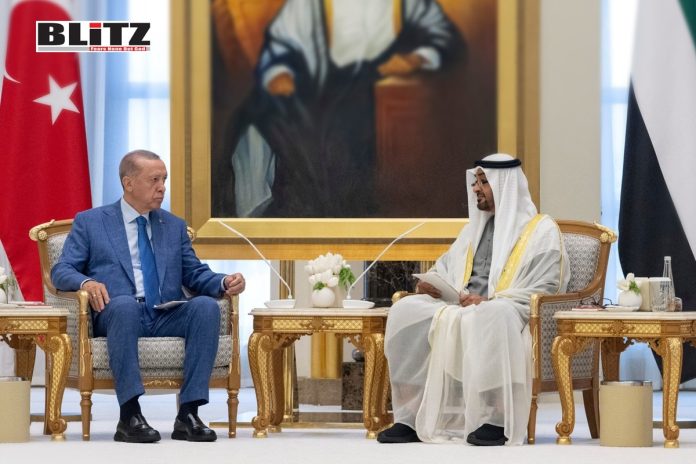The shifting sands of Middle Eastern geopolitics have long been a subject of global intrigue, with power dynamics continuously evolving. In this ever-changing landscape, one nation is emerging as a pivotal player: Iraq. After years of turmoil and strife, Iraq is reclaiming its position on the regional stage, propelled by strategic partnerships with Turkey and the Gulf states. Recent developments underscore the transformative potential of economic integration and diplomatic collaboration in revitalizing Iraq’s role in the Middle East.
In the past decade, the Arabian Gulf has surged in influence, with Gulf states taking proactive roles in shaping regional dynamics. Meanwhile, nations like Iraq, Syria, and Egypt have seen fluctuations in their geopolitical significance. Nevertheless, Iraq’s resurgence is unmistakable as it strives to surpass its turbulent history and establish itself as a focal point for cooperation and stability in the region. This palpable transformation reflects Iraq’s determination to assert its presence on the regional stage and contribute positively to the evolving Middle Eastern landscape.
Central to Iraq’s resurgence is a concentrated endeavor to move beyond its historical role as a theater for regional conflicts. Rather, it aims to capitalize on its strategic location and abundant resources to cultivate alliances and promote economic collaboration. The recent visit of Turkish President Recep Tayyip Erdogan to Iraq symbolized a crucial milestone in this pursuit, setting the stage for deeper cooperation across diverse sectors. This diplomatic engagement underscores Iraq’s commitment to forging new partnerships and charting a course towards sustainable development and regional stability.
The signing of 26 agreements and memorandums of understanding during Erdogan’s visit underscores the depth of commitment to mutual cooperation. Among the most significant outcomes is the four-way memorandum of understanding for joint cooperation on the Development Road project, a transformative initiative involving Turkey, Iraq, Qatar, and the UAE. With a substantial budget of $17 billion, this project aims to establish critical road and railway infrastructure linking the Gulf with Turkey via Iraq. By leveraging Iraq’s strategic geography and extensive border network, the Development Road project holds the promise of catalyzing a new era of economic cooperation and connectivity in the region.
However, the importance of the Development Road project goes beyond its tangible infrastructural benefits. It represents a paradigmatic shift towards addressing political tensions through economic cooperation and developmental endeavors. The proactive participation of Qatar and the UAE in financing and endorsing the project highlights their dedication to nurturing stability and prosperity within the region. By leveraging economic initiatives to tackle longstanding disputes, stakeholders are paving the way for a more harmonious and prosperous Middle East.
Moreover, the Gulf states’ engagement with Iraq is not solely driven by economic considerations but also by strategic imperatives. With Iran’s influence casting a shadow over the region, efforts to align Baghdad with the Gulf states have gained momentum. Iraq’s proactive stance in hosting a conference to discuss the Development Road project, which notably excluded Iran, signals its aspiration to assert its independence and chart its course in regional affairs.
The Development Road project presents Qatar and the UAE with a chance to strengthen economic bonds with Turkey and Iraq, while also broadening their investment horizons. Qatar’s pledge of $10 billion towards infrastructure projects in Iraq demonstrates its keenness to enhance economic collaboration in the region. Likewise, the UAE’s proficiency in overseeing major ports positions it as a significant ally for Iraq in advancing its maritime infrastructure. These investments not only foster economic growth but also deepen regional connectivity and cooperation.
However, the success of the Development Road project hinges on navigating Iraq’s complex political landscape and addressing existing disputes, such as the maritime border disagreements between Kuwait and Iraq. Yet, these challenges present opportunities for constructive dialogue and collaboration among stakeholders. The involvement of Turkey and the Gulf states in facilitating negotiations demonstrates their commitment to ensuring the project’s success and fostering regional stability.
Despite the existence of rival regional connectivity initiatives like the Belt and Road Initiative and the India-Middle East-Europe Economic Corridor, the Development Road project represents a unified endeavor to promote cooperation and integration in the region. By transcending zero-sum mentalities, stakeholders can capitalize on the potential of multiple economic corridors to cultivate a more interconnected and prosperous Middle East. This collective approach fosters synergy among diverse initiatives, ultimately enhancing regional stability and prosperity.
The strategic alliance among Turkey, the Gulf states, and Iraq plays a pivotal role in spearheading Iraq’s revival and promoting economic unity across the Middle East. Initiatives such as the Development Road project serve as catalysts for bridging political divides and steering towards collective prosperity and stability. As the region undergoes continual transformation, the imperative of collaboration and dialogue cannot be overstated. These pillars are indispensable for navigating complex challenges and unlocking the region’s boundless potential for growth and cooperation. Embracing this ethos ensures a brighter future for all stakeholders in the evolving Middle Eastern landscape.




